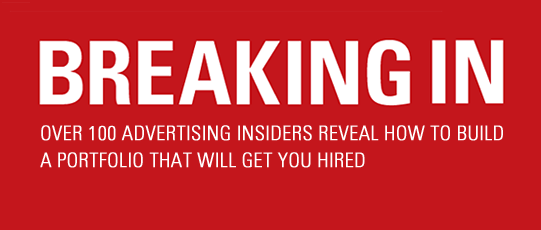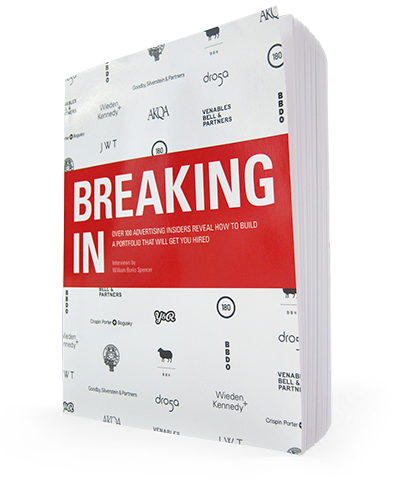WS: What do you look for in a student book? And what impresses you?
KW: First I look for clarity of thought and simplicity in the presentation of that thought. So for instance, I like to see an idea and sometimes it could be set up with, “This is what the idea is, and this is the execution of it.” I don’t need to see a thousand things in a book. If I see three to five strong ideas, contained, then that gets my attention. And if I want to see more, then I’ll ask for more. But I’d rather have less than more.
The ideas should be clear and expressed clearly. Also identify the media and how it would work, in print, online, TV, or radio because it’s not enough to have an idea, I want to know how it lives. And it should feel real. So it doesn’t matter to me if something is spec or hasn’t run because the idea, once it’s produced, it’s produced. It’s born. And that’s what I like to see.
And I personally like things that do not feel “ad-y.” And you see a lot of that in student books. But that’s also probably a symptom of how they’re taught. And I think the whole approach has to be revisited. And I think that needs to start at the teaching level. The teachers need to be more in tune with what’s happening outside of school, and how agencies are producing work, and the challenges that they’re facing as well. And the new buzzword I suppose is “integrated.” But for me, that’s still just multimedia.
[ … ]
WS: What do you think about including things that aren’t ads?
KW: Absolutely important. I would say, if you’re a writer, include writing. And it could be a short piece of fiction, long fiction, something that shows your way of thinking, your imagination, your tone of voice. And that, for me, is very important. I’m not necessarily that interested in seeing ads, because for me, ads are what you’re going to be asked to do. And for me it’s always retrospective anyway—what someone has done. It’s more about what they will do that decides whether or not we will work with someone, because we don’t want another ad. We have to keep evolving, pushing things forward. Our work in the future may be a TV show. And it may be a short film in addition to a headline. I think, particularly with writers, we want to see writing. And again, I would say be very edited, very clear, very focused. Less is more. And for art directors, I absolutely want to see personal work. I want to see what your sensibility is as a designer, as an art director. What your taste level is. How you put things together. So personal work is important.
WS: And what do you think is the best way to improve if you’re just starting out?
KW: Well I would say look at work that moves you. Look at work that you admire and just study it. And think about, “How was this done?” I mean, writers do this all the time. If they’re reading a book, they think, “How did they do it? How was this done?” Because as you’re reading it, you’re just experiencing the narrative. But if you’re actually a writer yourself and you’re developing your craft, you want to know, “How did they do that?” And you should study work that you really like.
It’s the same with movies. Tarantino, he was a cinephile. And that helps him, I think, in his own work. So it’s developing a point of view and, again, keeping it really, really simple. And not derivative either. Try to be as original as you can in your expression. And I think by knowing what’s out there, you can develop your own point of view so that it feels fresh. Because a creative director is looking for someone who will not only solve a creative problem, but also build the reputation of the agency and also their reputation as a creative director. Because, at the end of the day, they’re being judged on the output of the creative department. And if the work is not great, it’s a bad reflection on them. So they want to hire someone that’s going to make them look good and also make their lives easier as a creative director. So those are the kind of parameters I’m looking for when I see a book.
It’s also potential. You just feel it if someone can do it. And someone who can interact with people at all levels. And be collaborative, and creative, and a pleasure to work with as well. And somebody you want to partner with and you feel comfortable with. And I would also say people starting out should also develop their presentation skills and be good persuaders. But you first have to believe in your work. And then I think the persuasion part comes naturally if you really believe in it. And just be inspired and stay inspired. Look at stuff outside of advertising. Because ads, let’s face it, are just a small part of what is out there. And actually advertising’s not that interesting anymore. I mean, it’s all about communication and creating things that people want to spend time with and seek out. So we have to be clever, I think, and relevant.
And then one other thing about the presentation of a book: I would strongly recommend putting everything together in a website. I think it’s the perfect format for showing your work. And then, if there’s interest, maybe follow up with a printed piece as a leave-behind. But to be honest with you, I’m trying to get rid of clutter. So for me, it’s great to just have a link to a website. It’s an efficient way to get your work seen by as many people as possible.


Comments are closed.